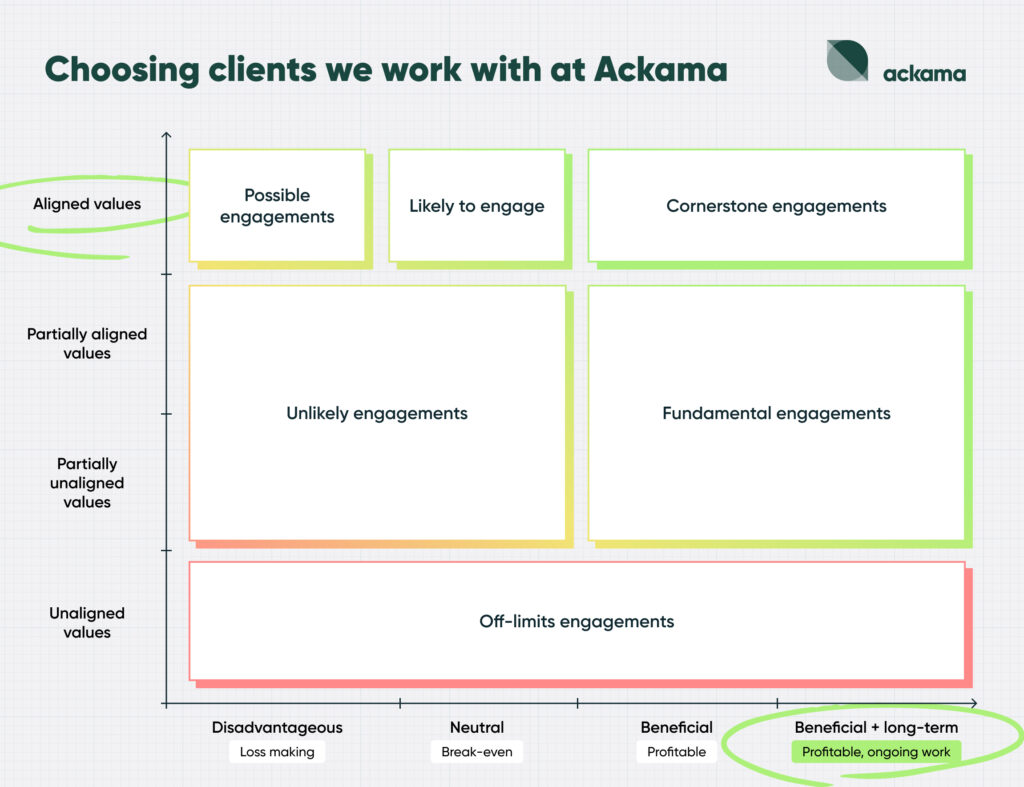In our world, decisions are more than just a crossroad between profit and loss; they’re about aligning with our deeper purpose. At Ackama, we don’t just look at the immediate returns but the broader impact of our actions. This ethos is woven into our decision-making fabric, guiding us to choose projects that resonate with our mission to improve our world through technology. The journey isn’t always straightforward. Balancing the books while staying true to our ethical compass has its challenges. Yet, it’s this very commitment to doing right by our people, our clients, and the planet that sets this approach apart.
Navigating Our Project Pipeline
Our approach to managing our project pipeline is nuanced. We prioritise keeping our team engaged, even if it means taking on less profitable work at times to maintain momentum. Yet, when our pipeline is full, our focus shifts to selecting projects that not only promise profitability but also resonate with our values and long-term vision and mission. It’s a delicate balance, one that requires a deep understanding of our current capabilities and future aspirations.
The Intricacies of Project Selection
Choosing which projects to pursue is a multi-faceted process that we use a matrix framework for. It begins with identifying opportunities that align with our strategic goals and ethical standards. Our business development team plays a crucial role here, evaluating each potential project’s alignment and profitability. It’s not just about the numbers; it’s about the potential impact we can make and alignment with our values. This means sometimes working on projects that may challenge the status quo or push us into new, impactful directions.

Cornerstone engagements: We prioritise key projects sustaining profitability, aligning with our values, and driving Ackama’s brand legacy with long-term client relationships and societal impact, embodying a synergy of ethical commitment and strategic success.
Likely to engage: Though not profitable, they uphold our ethos and sustain our mission, anchoring us to our core principles.
Possible engagements: Projects that can spark change or offer strategic value beyond finances.
Fundamental engagements: These are projects where we can see opportunity to improve outcomes while supporting the longevity of us as a business. They are the core that allows us to take a long term sustainable view of the work that we do.
Unlikely engagements: We avoid engagements that offer limited benefits and may detract from our mission, focusing instead on more impactful opportunities aligned with our goals and values.
Off-limits engagements: We categorically reject projects contradicting our core values to preserve our integrity, trust with stakeholders, and team morale, recognising the potential harm to our ethics and strategic objectives.
Prioritising Ethics and Strategic Alignment
Our commitment extends beyond the initial selection process. Throughout the project lifecycle, from proposal to completion, we continually assess alignment with our values, seeking opportunities to enhance positive impact within the project, for the client or our people. This could mean adjusting project scopes to better serve societal needs or prioritising projects that offer significant benefits beyond financial gains.
Embracing Flexibility and Responsibility
Understanding the importance of flexibility, we aim to continuously create an environment where our team can thrive, aligning projects with personal values and making space for meaningful work. Moreover, we’re vigilant about the broader implications of our engagements, ready to reassess our involvement should ethical concerns arise, ensuring our actions always reflect our commitment to doing good.
A Call to Reflection
Reflecting on our journey, Ackama’s approach is deeply rooted in our commitment to our mission. This dedication has strengthened our client relationships, allowed our staff to grow, and ensured our projects make a meaningful impact. As we move forward, we’re committed to this ethical path and hope it encourages others to consider the broader effects of their decisions. It’s about creating positive change, grounded in delivering thoughtful technology and design.




